英语介词
- 格式:doc
- 大小:92.50 KB
- 文档页数:10
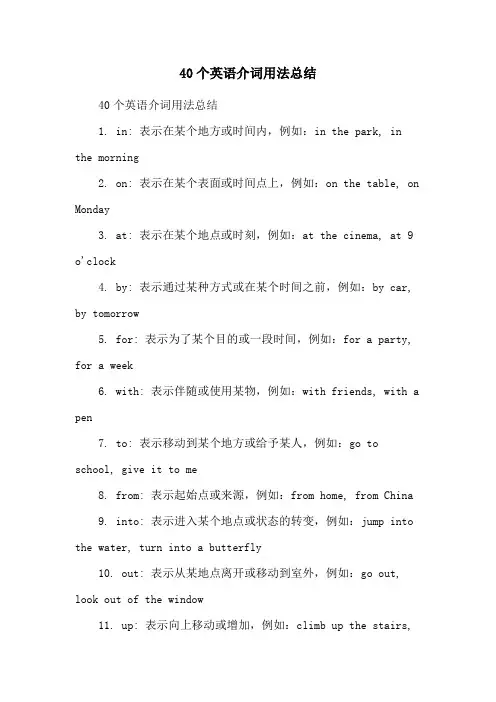
40个英语介词用法总结40个英语介词用法总结1. in: 表示在某个地方或时间内,例如:in the park, in the morning2. on: 表示在某个表面或时间点上,例如:on the table, on Monday3. at: 表示在某个地点或时刻,例如:at the cinema, at 9 o'clock4. by: 表示通过某种方式或在某个时间之前,例如:by car, by tomorrow5. for: 表示为了某个目的或一段时间,例如:for a party, for a week6. with: 表示伴随或使用某物,例如:with friends, with a pen7. to: 表示移动到某个地方或给予某人,例如:go to school, give it to me8. from: 表示起始点或来源,例如:from home, from China9. into: 表示进入某个地点或状态的转变,例如:jump into the water, turn into a butterfly10. out: 表示从某地点离开或移动到室外,例如:go out, look out of the window11. up: 表示向上移动或增加,例如:climb up the stairs,wake up12. down: 表示向下移动或减少,例如:walk down the hill, calm down13. about: 表示关于某事或在某个范围内,例如:talk about the movie, wander about the city14. off: 表示离开或关闭,例如:get off the bus, turnoff the lights15. on: 表示打开或激活,例如:turn on the TV, switch on the computer16. over: 表示越过或在某地上方,例如:jump over the fence, fly over the city17. under: 表示在某物下面或被控制或影响,例如:hide under the bed, live under his rules18. with: 表示具有某种特征或和某人一起做某事,例如:a man with blue eyes, dance with me19. without: 表示没有某物或在缺乏某物的情况下,例如:go without food, live without regret20. by: 表示通过某种方式,例如:learn by doing, go by bus21. through: 表示穿过某物或完成某事,例如:walk through the door, go through the documents22. across: 表示横穿某物或在某个范围内,例如:swimacross the river, all across the world23. between: 表示在两个事物之间或在某个时间段,例如:choose between two options, between 9 and 10 o'clock24. among: 表示在三个或三个以上事物之间或在某群人中,例如:share among friends, discuss among colleagues25. around: 表示在周围或在某个时间点附近,例如:walk around the park, around midnight26. through: 表示通过某事物或在某段时间内,例如:read through the book, work through the night27. against: 表示反对或靠在某物上,例如:fight against injustice, lean against the wall28. for: 表示代表或支持某人或某事,例如:vote for a candidate, fight for freedom29. towards: 表示朝向某个方向或对某人有好感,例如:walk towards the beach, feel towards someone30. within: 表示在某个时间或范围内,例如:arrive within an hour, within the city limits31. beyond: 表示超出某个界限或超过某个程度,例如:beyond expectations, beyond the horizon32. along: 表示沿着某个路线或伴随某人一起,例如:walk along the street, sing along with the song33. above: 表示在某物之上或高于某个程度,例如:flyabove the clouds, above average34. below: 表示在某物之下或低于某个程度,例如:swim below the surface, below freezing35. beside: 表示在某物旁边或和某人一起,例如:sit beside me, beside the lake36. near: 表示在某物附近或接近某个时间,例如:live near the beach, near the end37. past: 表示经过某个地点或在某个时间之后,例如:walk past the store, past midnight38. around: 表示在周围或大约某个数量,例如:look around the room, around 20 people39. after: 表示在某个时间之后或追求某人或某事,例如:after dinner, run after the dog40. before: 表示在某个时间之前或在某个事件之前,例如:before sunrise, before the meeting这些介词是英语中常用的一些基本介词,它们在表达地点、时间、方式等方面起到了重要的作用。
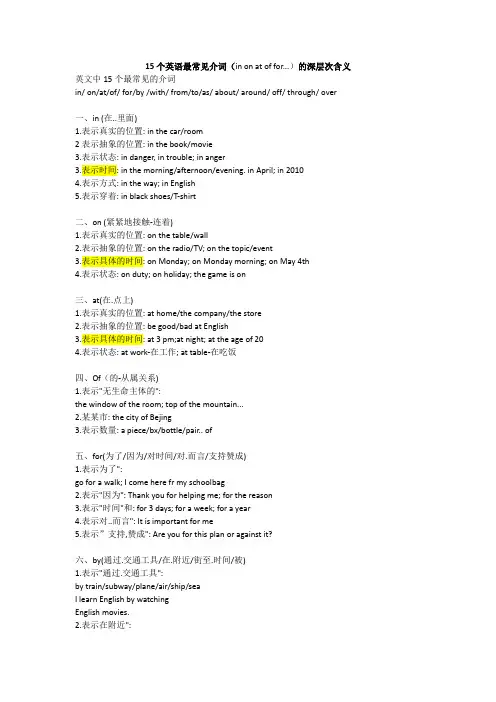
15个英语最常见介词(in on at of for...)的深层次含义英文中15个最常见的介词in/ on/at/of/ for/by /with/ from/to/as/ about/ around/ off/ through/ over一、in (在..里面)1.表示真实的位置: in the car/room2表示抽象的位置: in the book/movie3.表示状态: in danger, in trouble; in anger3.表示时间: in the morning/afternoon/evening. in April; in 20104.表示方式: in the way; in English5.表示穿着: in black shoes/T-shirt二、on (紧紧地接触-连着)1.表示真实的位置: on the table/wall2.表示抽象的位置: on the radio/TV; on the topic/event3.表示具体的时间: on Monday; on Monday morning; on May 4th4.表示状态: on duty; on holiday; the game is on三、at(在.点上)1.表示真实的位置: at home/the company/the store2.表示抽象的位置: be good/bad at English3.表示具体的时间: at 3 pm;at night; at the age of 204.表示状态: at work-在工作; at table-在吃饭四、Of(的-从属关系)1.表示"无生命主体的":the window of the room; top of the mountain...2.某某市: the city of Bejing3.表示数量: a piece/bx/bottle/pair.. of五、for(为了/因为/对时间/对.而言/支持赞成)1.表示为了":go for a walk; I come here fr my schoolbag2.表示"因为": Thank you for helping me; for the reason3.表示"时间"和: for 3 days; for a week; for a year4.表示对..而言": It is important for me5.表示”支持,赞成": Are you for this plan or against it?六、by(通过.交通工具/在.附近/街至.时间/被)1.表示"通过.交通工具":by train/subway/plane/air/ship/seaI learn English by watchingEnglish movies.2.表示在附近":a table by the window; the house is by the lake3.表示"截至到..时间":by the end of next week; by 20194.表示"被(被动语态)":English is spoken by people all over the world.七、with (伴随)1.表示"和.起":go with:play with;make friends with;cooperate with2.表示"携有,带有":a county with a long history; a house with a big garden3.表示..工具:cut the apple with the knife4.表示"伴随":with the development of the society;with the help of my teacher;I don't have any cash with me.八、from (远离)1.表示"来自":I am/come from China;a gift from my best friend;a man from America2.由"远离"来记短语:stop/prevent/keep sb from doing sth阻止某人做某事be away from...远离...be different from与.不同be absent from缺席....how far is it from here?它离这远The paper is made from wood.这纸是由木头制成的3.表示..到": from...to...由"指向"来理解下列用法:The road leads to Paris.这条路通往巴黎Smoking is harmful to your health.吸烟有害健康the answer to the question.这个问题的答案九、to (指向..)contribute to对..做贡献on one's way to... 在某人去某地的路上belong to属于..be used to doing sth习惯于做某事lead to...导致十、as作为He works as a tour guide.他作为导游工作。
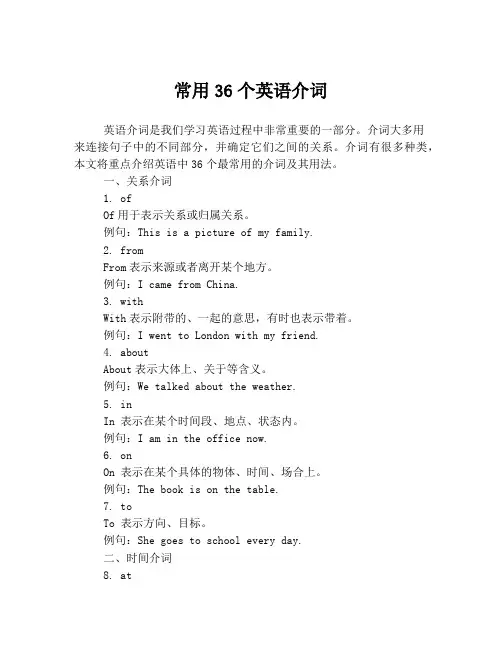
常用36个英语介词英语介词是我们学习英语过程中非常重要的一部分。
介词大多用来连接句子中的不同部分,并确定它们之间的关系。
介词有很多种类,本文将重点介绍英语中36个最常用的介词及其用法。
一、关系介词1. ofOf用于表示关系或归属关系。
例句:This is a picture of my family.2. fromFrom表示来源或者离开某个地方。
例句:I came from China.3. withWith表示附带的、一起的意思,有时也表示带着。
例句:I went to London with my friend.4. aboutAbout表示大体上、关于等含义。
例句:We talked about the weather.5. inIn 表示在某个时间段、地点、状态内。
例句:I am in the office now.6. onOn 表示在某个具体的物体、时间、场合上。
例句:The book is on the table.7. toTo 表示方向、目标。
例句:She goes to school every day.二、时间介词8. atAt 表示时间的具体点,通常与钟表时间连用。
例句:I will meet you at 2 o'clock.9. onOn 表示在某个具体的时间点。
例句:My birthday is on May 1st.10. inIn 表示在某个时间段内。
例句:I will return to China in six months.三、方向介词11. in front ofIn front of 表示前面。
例句:There are two chairs in front of the desk.12. behindBehind 表示后面。
例句:The cat is hiding behind the sofa.13. aboveAbove 表示在上方。
例句:The sun is above the clouds.14. belowBelow 表示在下方。
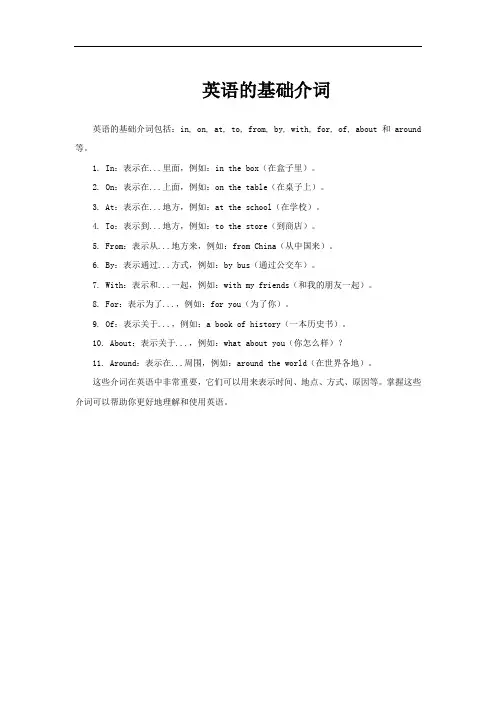
英语的基础介词
英语的基础介词包括:in, on, at, to, from, by, with, for, of, about 和 around 等。
1. In:表示在...里面,例如:in the box(在盒子里)。
2. On:表示在...上面,例如:on the table(在桌子上)。
3. At:表示在...地方,例如:at the school(在学校)。
4. To:表示到...地方,例如:to the store(到商店)。
5. From:表示从...地方来,例如:from China(从中国来)。
6. By:表示通过...方式,例如:by bus(通过公交车)。
7. With:表示和...一起,例如:with my friends(和我的朋友一起)。
8. For:表示为了...,例如:for you(为了你)。
9. Of:表示关于...,例如:a book of history(一本历史书)。
10. About:表示关于...,例如:what about you(你怎么样)?
11. Around:表示在...周围,例如:around the world(在世界各地)。
这些介词在英语中非常重要,它们可以用来表示时间、地点、方式、原因等。
掌握这些介词可以帮助你更好地理解和使用英语。
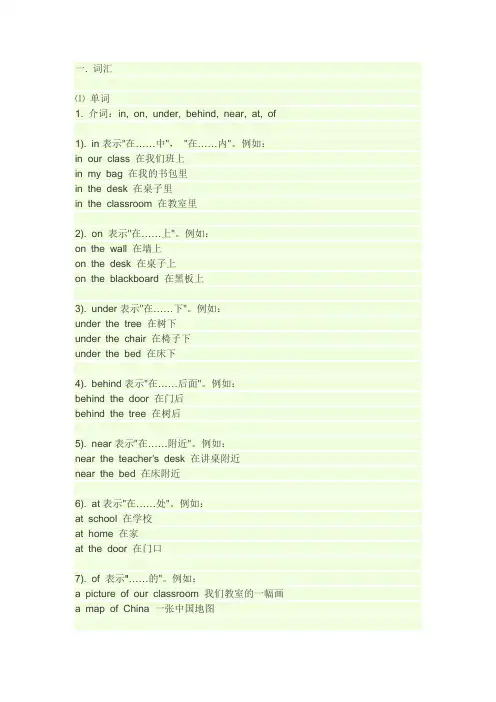
一. 词汇⑴单词1. 介词:in, on, under, behind, near, at, of1). in表示"在……中","在……内"。
例如:in our class 在我们班上in my bag 在我的书包里in the desk 在桌子里in the classroom 在教室里2). on 表示"在……上"。
例如:on the wall 在墙上on the desk 在桌子上on the blackboard 在黑板上3). under表示"在……下"。
例如:under the tree 在树下under the chair 在椅子下under the bed 在床下4). behind表示"在……后面"。
例如:behind the door 在门后behind the tree 在树后5). near表示"在……附近"。
例如:near the teacher's desk 在讲桌附近near the bed 在床附近6). at表示"在……处"。
例如:at school 在学校at home 在家at the door 在门口7). of 表示"……的"。
例如:a picture of our classroom 我们教室的一幅画a map of China 一张中国地图2. 冠词a / an / the:冠词一般位于所限定的名词前,用来署名名词所指的人或事物。
冠词有不定冠词和定冠词两种。
不定冠词有两个形式,即a和an。
a用在以辅音音素开头的词前,如a book; an用在以元音音素开头的字母前,如an apple.a或an与可数名词单数连用,泛指某类人或某物中的一个。
This is a cat.这是一只猫。
It's an English book.这是一本英语书。
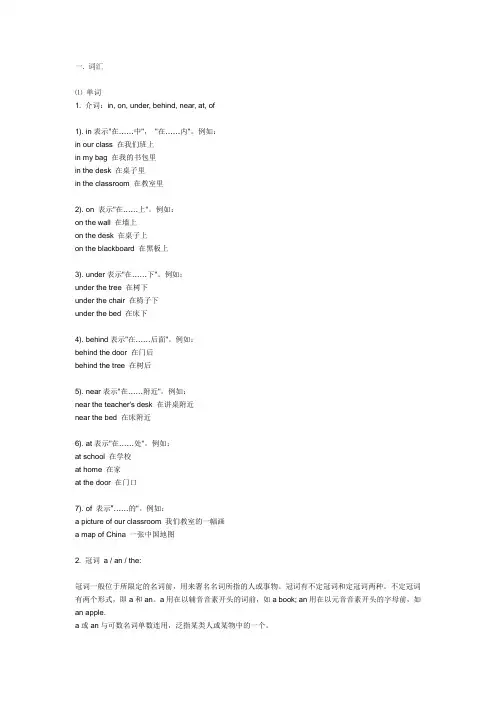
一. 词汇⑴单词1. 介词:in, on, under, behind, near, at, of1). in表示"在……中","在……内"。
例如:in our class 在我们班上in my bag 在我的书包里in the desk 在桌子里in the classroom 在教室里2). on 表示"在……上"。
例如:on the wall 在墙上on the desk 在桌子上on the blackboard 在黑板上3). under表示"在……下"。
例如:under the tree 在树下under the chair 在椅子下under the bed 在床下4). behind表示"在……后面"。
例如:behind the door 在门后behind the tree 在树后5). near表示"在……附近"。
例如:near the teacher's desk 在讲桌附近near the bed 在床附近6). at表示"在……处"。
例如:at school 在学校at home 在家at the door 在门口7). of 表示"……的"。
例如:a picture of our classroom 我们教室的一幅画a map of China 一张中国地图2. 冠词a / an / the:冠词一般位于所限定的名词前,用来署名名词所指的人或事物。
冠词有不定冠词和定冠词两种。
不定冠词有两个形式,即a和an。
a用在以辅音音素开头的词前,如a book; an用在以元音音素开头的字母前,如an apple.a或an与可数名词单数连用,泛指某类人或某物中的一个。
This is a cat.这是一只猫。
It's an English book.这是一本英语书。
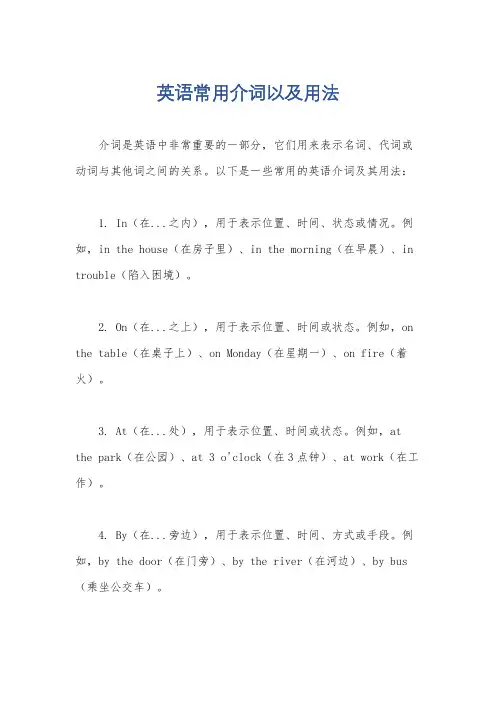
英语常用介词以及用法介词是英语中非常重要的一部分,它们用来表示名词、代词或动词与其他词之间的关系。
以下是一些常用的英语介词及其用法:1. In(在...之内),用于表示位置、时间、状态或情况。
例如,in the house(在房子里)、in the morning(在早晨)、in trouble(陷入困境)。
2. On(在...之上),用于表示位置、时间或状态。
例如,on the table(在桌子上)、on Monday(在星期一)、on fire(着火)。
3. At(在...处),用于表示位置、时间或状态。
例如,at the park(在公园)、at 3 o'clock(在3点钟)、at work(在工作)。
4. By(在...旁边),用于表示位置、时间、方式或手段。
例如,by the door(在门旁)、by the river(在河边)、by bus (乘坐公交车)。
5. For(为了),用于表示目的、受益者或时间。
例如,for you(为你)、for two hours(两个小时)、for fun(为了好玩)。
6. With(和...一起),用于表示伴随、方式或工具。
例如,with my friends(和我的朋友们一起)、with care(小心地)、with a knife(用刀)。
7. From(从...处),用于表示起点、来源或时间。
例如,from the store(从商店)、from China(来自中国)、from Monday to Friday(从周一到周五)。
这些介词只是英语中的一部分,但它们是最常用的。
它们的正确使用对于表达清晰、准确的意思至关重要。
希望这些例子可以帮助你更好地理解英语介词的用法。
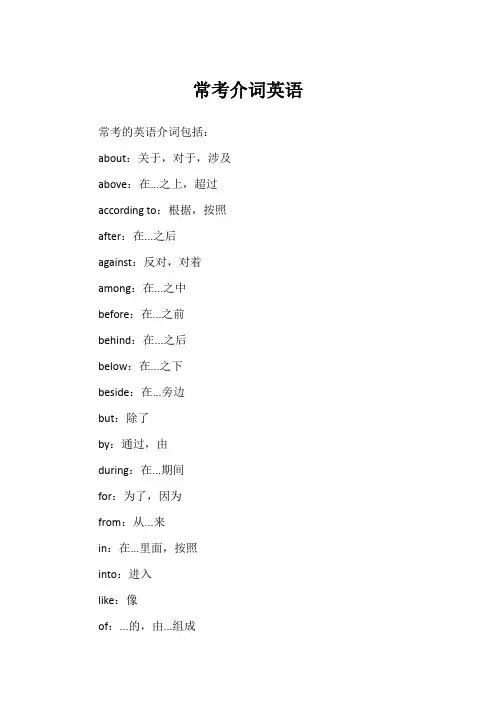
常考介词英语常考的英语介词包括:
about:关于,对于,涉及
above:在...之上,超过
according to:根据,按照
after:在...之后
against:反对,对着
among:在...之中
before:在...之前
behind:在...之后
below:在...之下
beside:在...旁边
but:除了
by:通过,由
during:在...期间
for:为了,因为
from:从...来
in:在...里面,按照
into:进入
like:像
of:...的,由...组成
off:离开,从...下来
on:在...上面
over:在...之上,超过
through:通过
to:向,到
under:在...之下
up:向上
with:和...一起,用
这些介词在英语中非常常用,掌握它们的用法和含义对于学习英语非常重要。
需要注意的是,不同的介词在不同的语境下可能有不同的含义和用法,因此需要根据具体情况进行理解和运用。
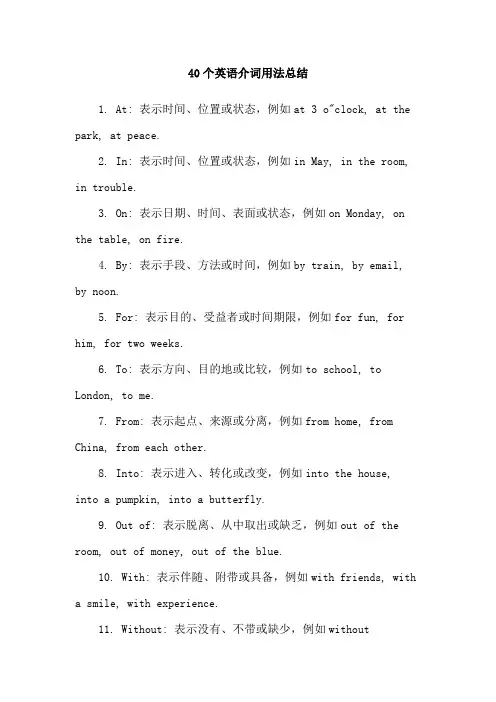
40个英语介词用法总结1. At: 表示时间、位置或状态,例如at 3 o"clock, at the park, at peace.2. In: 表示时间、位置或状态,例如in May, in the room, in trouble.3. On: 表示日期、时间、表面或状态,例如on Monday, on the table, on fire.4. By: 表示手段、方法或时间,例如by train, by email, by noon.5. For: 表示目的、受益者或时间期限,例如for fun, for him, for two weeks.6. To: 表示方向、目的地或比较,例如to school, to London, to me.7. From: 表示起点、来源或分离,例如from home, from China, from each other.8. Into: 表示进入、转化或改变,例如into the house,into a pumpkin, into a butterfly.9. Out of: 表示脱离、从中取出或缺乏,例如out of the room, out of money, out of the blue.10. With: 表示伴随、附带或具备,例如with friends, witha smile, with experience.11. Without: 表示没有、不带或缺少,例如withoutpermission, without shoes, without doubt.12. Over: 表示覆盖、超过或结束,例如over the roof, over the limit, over and done with.13. Under: 表示在下面、被支配或不足,例如under the table, under his control, under budget.14. About: 表示关于、大约或忙于,例如about the movie, about 10 dollars, about to leave.15. Above: 表示在上面、高于或超过,例如above the clouds, above average, above suspicion.16. Below: 表示在下面、低于或不足,例如below the surface, below freezing, below par.17. Across: 表示横穿、相交或涉及,例如across the street, across the board, across his mind.18. Beyond: 表示超出、远离或除了,例如beyond repair, beyond belief, beyond her control.19. Around: 表示周围、附近或环绕,例如around the corner, around the clock, around the world.20. Before: 表示以前、在前面或比较,例如before noon, before the house, before his time.21. Behind: 表示在后面、落后或背后,例如behind the house, behind schedule, behind the scenes.22. Beside: 表示在旁边、与...相比或附加,例如besidethe river, beside myself, beside the point.23. Inside: 表示内部、在里面或被包含,例如inside the box, inside the building, inside information.24. Outside: 表示外部、在外面或超出,例如outside the house, outside the box, outside the norm.25. Through: 表示穿过、经过或完成,例如through the door, through the park, through with it.26. Throughout: 表示遍布、贯穿或在整个期间,例如throughout the city, throughout history, throughout the day.27. Towards: 表示朝向、对于或接近,例如towards the sun, towards him, towards the end.28. Against: 表示反对、抵抗或紧挨着,例如against the law, against the current, against the wall.29. Among: 表示在...之中、相互之间或被分配到,例如among friends, among the stars, among the winners.30. Between: 表示在两者之间、在中间或相互之间,例如between two trees, between classes, between you and me.31. Within: 表示在内部、在范围之内或在规定时间内,例如within the house, within the budget, within a week.32. Without: 表示在外面、没有或不用,例如without the room, without a doubt, without further ado.33. Beneath: 表示在下面、低于或不足,例如beneath the surface, beneath his dignity, beneath contempt.34. Beside: 表示在旁边、与...相比或附加,例如beside the river, beside myself, beside the point.35. Into: 表示进入、转化或改变,例如into the house, into a pumpkin, into a butterfly.36. Upon: 表示在...之上、一旦发生或基于,例如upon the hill, upon arrival, upon further consideration.37. With: 表示伴随、附带或具备,例如with friends, witha smile, with experience.38. Within: 表示在内部、在范围之内或在规定时间内,例如within the house, within the budget, within a week.39. Without: 表示没有、不带或缺少,例如without permission, without shoes, without doubt.40. Beneath: 表示在下面、低于或不足,例如beneath the surface, beneath his dignity, beneath contempt.。
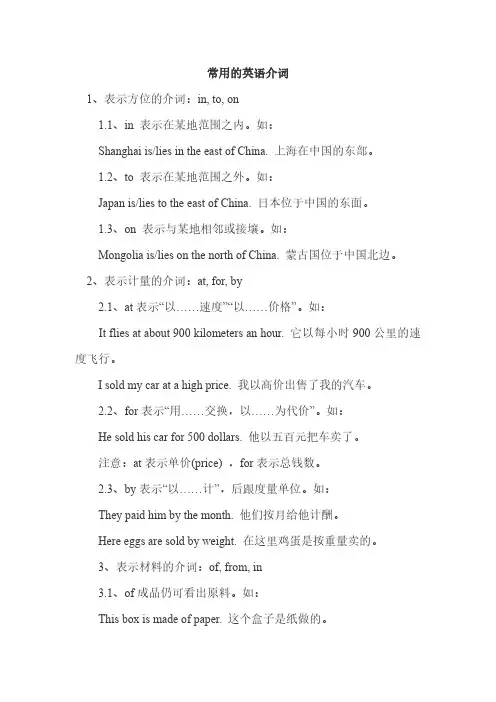
常用的英语介词1、表示方位的介词:in,to,on1.1、in表示在某地范围之内。
如:Shanghai is/lies in the east of China.上海在中国的东部。
1.2、to表示在某地范围之外。
如:Japan is/lies to the east of China.日本位于中国的东面。
1.3、on表示与某地相邻或接壤。
如:Mongolia is/lies on the north of China.蒙古国位于中国北边。
2、表示计量的介词:at,for,by2.1、at表示“以……速度”“以……价格”。
如:It flies at about900kilometers an hour.它以每小时900公里的速度飞行。
I sold my car at a high price.我以高价出售了我的汽车。
2.2、for表示“用……交换,以……为代价”。
如:He sold his car for500dollars.他以五百元把车卖了。
注意:at表示单价(price),for表示总钱数。
2.3、by表示“以……计”,后跟度量单位。
如:They paid him by the month.他们按月给他计酬。
Here eggs are sold by weight.在这里鸡蛋是按重量卖的。
3、表示材料的介词:of,from,in3.1、of成品仍可看出原料。
如:This box is made of paper.这个盒子是纸做的。
3.2、from成品已看不出原料。
如:Wine is made from grapes.葡萄酒是葡萄酿成的。
3.3、in表示用某种材料或语言。
如:Please fill in the form in pencil first.请先用铅笔填写这个表格。
They talk in English.他们用英语交谈。
注意:in指用材料,不用冠词;而with指用工具,要用冠词。
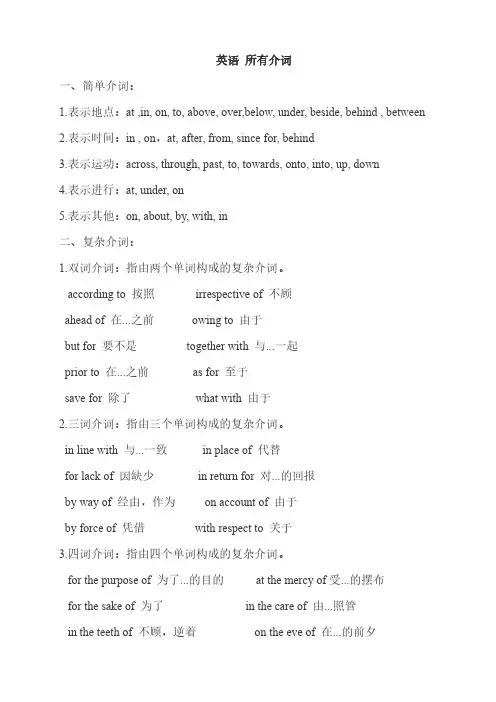
英语所有介词一、简单介词:1.表示地点:at,in,on,to,above,over,below,under,beside,behind,between2.表示时间:in,on,at,after,from,since for,behind3.表示运动:across,through,past,to,towards,onto,into,up,down4.表示进行:at,under,on5.表示其他:on,about,by,with,in二、复杂介词:1.双词介词:指由两个单词构成的复杂介词。
according to按照irrespective of不顾ahead of在...之前owing to由于but for要不是together with与...一起prior to在...之前as for至于save for除了what with由于2.三词介词:指由三个单词构成的复杂介词。
in line with与...一致in place of代替for lack of因缺少in return for对...的回报by way of经由,作为on account of由于by force of凭借with respect to关于3.四词介词:指由四个单词构成的复杂介词。
for the purpose of为了...的目的at the mercy of受...的摆布for the sake of为了in the care of由...照管in the teeth of不顾,逆着on the eve of在...的前夕on the ground of根据on the part of在...方面to the exclusion of把...排除在外with an eye to为了under the auspices of在...的支持下under the guise of在...的幌子下。
英语中常用的介词
介词是一种用来连接名词、代词或动词与其他词语的词汇,以表明它们之间的关系。
以下是一些英语中常用的介词:
- at:表示在某个时间点或地点。
- in:表示在某个时间段或空间范围内。
- on:表示在某个具体的日期或表面上。
- for:表示目的、原因或持续时间。
- with:表示伴随或使用某种工具或手段。
- by:表示通过某种方式或手段。
- from:表示来源或起点。
- to:表示去向或目标。
- about:表示关于或涉及到。
- above:表示在上方或超过。
- below:表示在下方或低于。
- behind:表示在后面或支持。
- beside:表示在旁边或除了。
- between:表示在两者之间。
- among:表示在三者或以上之间。
- across:表示穿过或横跨。
- through:表示穿过或通过。
- around:表示环绕或在周围。
- inside:表示在内部或里面。
- outside:表示在外部或外面。
- near:表示在附近或接近。
- far:表示在远处或远离。
介词英语词汇表介词英语词汇表介词是英语语法中的重要组成部分,用于表达词与词之间的关系。
掌握常见的介词词汇,可以帮助我们更准确地表达自己的意思。
下面是一份介词词汇表,供大家参考和学习。
1. about - 关于2. above - 在...上方3. across - 穿过4. after - 在...之后5. against - 靠着,对抗6. along - 沿着7. among - 在...之中8. around - 在...周围9. as - 作为10. at - 在...的地方11. before - 在...之前12. behind - 在...后面13. below - 在...下面14. beneath - 在...之下15. beside - 在...旁边16. between - 在...之间17. beyond - 超出...的范围18. by - 通过,靠近19. down - 向下20. during - 在...期间21. except - 除了...之外22. for - 为了23. from - 来自24. in - 在...里面25. into - 进入26. like - 像27. near - 靠近28. of - 属于29. off - 关闭30. on - 在...上31. over - 在...之上32. past - 经过33. through - 通过,穿过34. to - 向,到35. toward(s) - 向,朝着36. under - 在...下面37. until - 直到38. up - 向上39. with - 和...一起40. without - 没有以上是常见的介词词汇表,希望对大家学习英语有所帮助。
通过掌握这些介词,我们可以更加准确地描述和表达自己的思想和意见。
希望大家认真学习,多加练习,提高自己的英语水平。
祝愿大家在学习英语的道路上取得更大的进步!(本文总字数:223)。
英语十大介词介绍介词是英语中常用的词类之一,用来表示名词与其他词或词组之间的关系。
在英语中,有很多常用的介词,下面是对英语十大常用介词的简要介绍:1. in:表示在某个地方或某个时间内,例如 "in the park"(在公园里),"in the morning"(在早晨)。
in:表示在某个地方或某个时间内,例如 "in the park"(在公园里),"in the morning"(在早晨)。
2. on:表示在某个表面上或某个具体的日子,例如 "on the table"(在桌子上),"on Monday"(在星期一)。
on:表示在某个表面上或某个具体的日子,例如 "on the table"(在桌子上),"on Monday"(在星期一)。
3. at:表示在某个地点或某个时间点,例如 "at the bookstore"(在书店里),"at 6 o'clock"(在六点钟)。
at:表示在某个地点或某个时间点,例如 "at the bookstore"(在书店里),"at 6 o'clock"(在六点钟)。
4. by:表示通过某种方式或由某人完成,例如 "by train"(乘坐火车),"written by John"(由约翰写的)。
by:表示通过某种方式或由某人完成,例如 "by train"(乘坐火车),"written by John"(由约翰写的)。
5. for:表示为某个目的或时间段,例如 "for studying"(为了研究),"for two hours"(两个小时)。
介词英语单词大全100个一、简单介词。
1. about [əˈbaʊt] prep. 关于;大约。
2. above [əˈbʌv] prep. 在……上面;超过。
3. across [əˈkrɒs] prep. 穿过;横穿。
4. after [ˈɑːftə(r)] prep. 在……之后。
5. against [əˈɡenst] prep. 反对;靠着。
6. along [əˈlɒŋ] prep. 沿着。
7. among [əˈmʌŋ] prep. 在……中间(三者或三者以上)8. around [əˈraʊnd] prep. 在……周围;大约。
9. as [əz] prep. 作为;当作。
10. at [æt] prep. 在(表示存在或出现的地点、场所、位置、空间等);以(某种价格、速度等)11. before [bɪˈfɔː(r)] prep. 在……之前。
12. behind [bɪˈhaɪnd] prep. 在……后面。
13. below [bɪˈləʊ] prep. 在……下面;低于。
14. beneath [bɪˈniːθ] prep. 在……之下(正下方)15. beside [bɪˈsaɪd] prep. 在……旁边。
16. between [bɪˈtwiːn] prep. 在……之间(两者之间)17. beyond [bɪˈjɒnd] prep. 超过;越过;那一边。
18. but [bət] prep. 除……以外。
19. by [baɪ] prep. 被;由;通过;在……旁边;在……之前。
二、复合介词。
20. according to [əˈkɔːdɪŋ tuː] prep. 根据;按照。
21. ahead of [əˈhed ɒv] prep. 在……之前;胜过。
22. apart from [əˈpɑːt frəm] prep. 除……之外;且不说。
23. as for [æz fɔː(r)] prep. 至于;关于。
40个英语介词1. 介绍在英语中,介词是一类非常重要的词汇。
它们用于连接名词、代词或其他句子成分,并表示它们之间的关系。
在这篇文章中,我们将介绍40个常用的英语介词,帮助你更好地理解和使用它们。
2. 常用介词下面是40个常用的英语介词及其用法:1.about - 关于2.above - 在…之上3.across - 横过,穿过4.after - 在…之后5.against - 反对,靠着6.along - 沿着7.among - 在…中间8.around - 在…周围9.as - 作为10.at - 在…处11.before - 在…之前12.behind - 在…的后面13.below - 在…之下14.beside - 在…旁边15.between - 在…之间16.beyond - 在…之外17.but - 除了18.by - 通过19.despite - 尽管20.down - 向下21.during - 在…期间22.except - 除了23.for - 为了24.from - 从…出发25.in - 在…里面26.inside - 在…内部27.into - 进入28.like - 像29.near - 在…附近30.of - 属于,关于31.off - 离开32.on - 在…上面33.out - 出去34.over - 在…之上35.through - 通过36.to - 向37.toward - 向着38.under - 在…下面39.until - 直到40.up - 向上3. 示例句子下面是一些使用这些介词的示例句子:1.I’m talking about my trip to Europe.2.The bird is above the tree.3.He walked across the street.4.I will call you after the meeting.5.They are protesting against the new law.6.She walked along the beach.7.The cat is among the flowers.8.The children played around the playground.9.She works as a teacher.10.He was waiting at the bus stop.11.We arrived before the show started.12.The dog is hiding behind the couch.13.The treasure is buried below the tree.14.The book is beside the bed.15.Divide the candy between the children.16.The store is beyond the hill.17.I love all fruits, but I don’t like bananas.18.The letter is sent by mail.19.Despite the rain, we had a great time.20.Please write your name down on the paper.21.We met during the conference.22.I like all colors except green.23.He bought flowers for his wife.24.I received a letter from my friend.25.The book is in the drawer.26.The keys are inside the bag.27.She jumped into the pool.28.He behaves like a gentleman.29.The restaurant is near the park.30.This is a story of love and loss.31.She got off the bus at the next stop.32.The pen is on the desk.33.The cat ran out of the house.34.The bird flew over the trees.35.The car went through the tunnel.36.Please bring the package to the post office.37.He walked toward the sunset.38.The keys are under the pillow.39.They will stay here until tomorrow.40.She looked up at the sky.4. 总结介词在英语中扮演着非常重要的角色。
英语中常见的介词常用的英语介词有:in,on,with,by,for,at,about,under,of 等。
表示在某时间时,常用at,on,in等介词。
at用来表示在某一段时刻,如族老at six:在6点钟。
on用来表示在星期几或是某日,如:on Monday:在星期一。
in用来表示一天中的早中晚、月份、季节或年份。
如:in Spring在春天。
during,for,over,within,throughout,from和to等介词表示期间。
before,after,since,until,till,between,up to等,也有时间概念。
在表示方位时,常用at,in,on,to,for,above,over,below,under,in front of,in the front of,beside,behind等。
英语介词还可以表示进行,在作为表语时,at、on、under等可以表示正在进行的动作。
如:she is at work.她正在工作。
常用介词英语中常见的介词有:in(在)、on(在…上)、at(在…处)、by (靠着)、with(伴随)、for(为…)、of(关于)、to(向…)、from(铅汪来自…)、into(进入)、out of(离开)、about(关于)、against(反对)、among(在…中)、beside(在…旁边)、between(在…之间)、during(在…期间)、without(没有…)等。
介词的用法:1、in:用于表示在某个区域内,例如:in the room(在房间里);也用于表示在某个时间段内,例如:in the morning(在早上)。
2、on:用于表示在某个表面或位置上,例如:on the table(在桌子上);也用于表示在某个特定日期或时间点上,例如:on Monday (在星期一)。
3、at:用于表示在某个地点处,例如:at the station(在车站);也用于表示在某个特定时间点上,例如:at 2 o'clock(在2点钟)。
一、In介词 prep.1.(表示位置)在…里面; 在, 于; 在…部位上I could feel the tension in the room.我可以感觉到房间里的紧张气氛。
They live in France.他们住在法国。
2.(表示时间)在…时期, 在…之后, 在过程中In her twenties and thirties she had had no difficulty getting jobs.她在二三十岁时找工作一点也不困难。
I cannot see you now, come back in half an hour.我现在不能见你, 半小时后回来。
3.(表示方向)往…内, 朝…方向I saw him go in the shop.我看到他走进了商店。
4.(表示状态)处于…之中, 在…情况下Martin was in his pyjamas.马丁穿着睡衣。
They were living in terrible poverty.他们生活在极度贫困之中。
5.(表示方式)用, 以, 按, 乘, 以…形式They were speaking in Italian.他们在讲意大利语。
They went up in the lift.他们乘电梯上楼了。
6.(表示原因)由于, 为了He went in fear of his life.他为自己的性命担忧, 所以走了。
7.(表示领域, 范围)在…以内It is not in my power to do that.做那事非我力所能及。
8.(表示结果)当做, 作为What did you give him in return?你给他什么作为报答呢?9.(表示目的)为了They set off in search of the lost child.他们出发去寻找走失的孩子。
10.[表示职业、活动等]从事于,参加11.[表示数量、程度、比例]按,以;从…中12.[表示品质、能力等]在…之中;在…身上I don't think he had it in him.我认为他没这个本事。
副词 adv.1.进入, 入内The door being opened, they came in at once.门一打开, 他们就马上进来了。
2.在家, 在里面My wife won't be in until five o'clock.我妻子要到五点钟才在家。
3.到达, 来临Is the ship in yet?船到港了吗?4.当政, 当选This year the Conservative Party is in.今年保守党执政。
5.正当时令, 正当流行Honey peaches are in now and we can eat them every day.现在水蜜桃正上市, 我们每天都可以吃到。
6.向某处;向某方向;在附近;来到My mother will fly in this evening.我母亲今晚将飞抵这里。
7.(火等)燃烧着;(灯等)亮着8.(运气等)正好转;(油井)正出油;(潮水)正上涨9.一致;同意;赞成10.(游戏、比赛等)轮到11.在狱中What crime is he in for?他因什么罪而蹲监狱的?12.流行;时兴Those scarfs are in this year.今年流行那种围巾。
形容词 adj.1.在内的,在里面的;朝内的2.(车等)到站的;(船等)进港的3.在位的;当政的;当权的4.[口语]流行的;时兴的,入时的;赶时髦的二、On介词 prep.1.(表示位置)在…上, 在…旁, 在…身边That book on the desk is an atlas.桌上的那本书是地图册。
2.(表示时间)在…之时It occurred on the morning of the fifteenth.事情发生在15号的上午。
On arriving home, I was met by my daughter.到家时我的女儿出来迎接我。
3.(表示方向)向, 往, 朝; 沿着, 顺着They marched on the enemy's fortress.他们向敌人的要塞进军。
We were driving on a California freeway.我们正沿着加利福尼亚的一条快车道驾车行驶。
4.(表示状态)系于, 悬于; 附于A picture hangs on the wall.墙上挂着一幅画。
He carried a coat on his arm.他手臂上搭着一件外衣。
5.(表示方式)乘, 坐, 骑She will leave on an early train.她将乘早班火车离开。
We went to the factory on foot.我们步行到工厂去。
6.(表示对象)对, 对于, 碰在, 对…造成困难There is much to be said on both sides.公说公有理, 婆说婆有理。
The car broke down on us.汽车抛锚给我们造成了麻烦。
7.(表示原因)由于, 因为The old worker retired on account of age.老工人因年老而退休。
8.(表示比较)与…相比Today's weather is an improvement on yesterday's.今天的天气比昨天的好。
9.(表示方位)在…方位The town stands on the left bank of the river.该镇坐落在河的左岸。
The post office is on the right.邮局在右边。
副词 adv.1.(放, 穿, 连接)上He has new shoes on.他穿上新鞋。
2.向前, (继续)下去She worked on quietly all night.她整个晚上默默地继续工作。
They walked on a little way without speaking.他们默默无语地向前走了一段路。
名词 n.1.(发生、活动等的)情况,状态2.【板球】1). 左击球手右后方场地 2). 右击球手左后方场地 3). 侧击形容词 adj.1.活动着的,使用着的,起着作用的,开着的,接通的2.发生着的,正发生的3.计划中的三、Into介词 prep.1.(表示时间)持续到, 进行到The meeting carried on into the afternoon.会议一直延续到下午。
2.(表示方向)进入…中, 到…里Anney dived into the water.安尼潜入水中。
He came into the room.他到房子里面。
3.(表示状态)进入…状态, 欠…债They burst into laughter.他们突然大笑起来。
He is into me for one hundred yuan.他欠我100元。
4.(表示对象)撞上, 渗进, 非常喜欢He bumped into me.他撞上了我。
The oil will soak into the wood.油会渗进木头里。
She is into music.她喜欢音乐。
5.(表示目标)对着, 朝着She looked into my eyes.她盯着我的眼睛看。
6.(表示结果)分成, 变成He sawed the stick into pieces.他把棍子锯成几截。
Dusk deepened into night.黄昏变成了夜色。
She must be into her thirties by now.她一定30来岁了。
7.(表示所属)输入The information goes into a computer.这信息输入到电脑中。
8.(表示过程)从事于He talked of going into medicine.他谈到要学医。
9.(表示运算) 除Dividing 3 into 6 gives 2.六除以三等于二。
介词 prep.1.(表示时间)到, 直到, 在…到来之前, 离…The Parliament was prorogued to the tenth of February.议会休会到二月十日。
2.(表示方向)朝, 往, 通向He turned to his companion before he replied.他转身朝向他的伙伴然后回答。
3.(表示状态)紧贴着, 紧靠着, 对着The two lovers danced cheek to cheek.那对情侣脸贴着脸跳舞。
4.(表示对象)对, 对于, 对…来说What will Doris say to it?对此事多丽丝将怎么说呢?5.(表示比较)比, 相对于The men are noodles to her.与她相比, 这些男人都是笨蛋。
6.(表示方位)在…方向[方位], 处于…顺序Scotland is to the north of England.苏格兰在英格兰之北。
7.(表示距离)离, 距离It is ten kilometres to the station.到车站十公里。
8.(表示目标)到达, 直到We came to a picturesque cottage.我们来到一座风景如画的村落。
9.(表示结果)转换为, 转变为, 趋于Wait until the lights change to green.等交通灯变成绿色再走。
10.[表示归属]属于;…的the key to the classroom教室的钥匙11.[表示附加]附加于;加于add this to the others把这个加在另外几个上面12.[表示伴随]跟着;伴随;随同She danced to the music.她合着音乐跳舞。
13.关于;就…而言;对于;依…看What will he say to this?对此他会说什么?14.适合;合乎;对…的反应是副词 adv.1.向前His hat is on wrong side to.他的帽子前后戴歪了。
2.(门窗等)关上;虚掩着The door was blown to.风吹把门关上了。
3.开始;着手We turned to with a will.我们开始努力干。
4.在附近We were close to when it happened.事情发生时我们正在附近。
5.苏醒过来after he came to在他苏醒过来以后介词 prep.1.(表示时间)在…的, 在…之前; 在…期间He was born at the turn of the century.他出生于世纪之交。